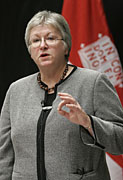Auditor General not 'watchdog' says Fraser
Auditor General not 'watchdog' says Fraser McGill University
User Tools (skip):
Auditor General not 'watchdog' says Fraser
An auditor, according to some wags in the public service, is someone who spends the day sitting on the hilltop, watching battles raging below, descending only at the end to shoot the survivors. Sheila Fraser would take issue with that. She'd be more likely to be counting the bullets expended.
Auditor General of Canada since 2002, Fraser regularly appears in the headlines for her damning reports of federal government misspending. Her job, she stressed at a recent talk at McGill, is not to be cop or crusader, but simply a seeker of truth.

Auditor General Sheila Fraser
Owen Egan
"I am neither a government watchdog nor, for that matter, am I a government ombudsman. People sometimes think I can resolve their concerns with government or intervene on their behalf. I can't do either. My mandate is to audit — end of story," she said.
Her path to Ottawa was not exactly a straightforward one — she calls herself the "accidental auditor general."
She initially enrolled at McGill as a science student until the theoretical nature of the degree, and a case of mono, took her out of the program. She enrolled in the BComm program on her doctor's advice, graduating in 1972. At that time, she was one of four or five women in a class of about 40 — a ratio she said was actually pretty good for the time. She took a job with a firm that became today's Ernst and Young, spending most of her career in Quebec City, where she rose to become a partner in the firm.
In 1999, the then-Auditor General Denis Desautels, a former partner in her firm, asked Fraser to become a deputy Auditor General. In years past, this would have meant that Fraser actually had less of a chance of getting the top job. The Auditor General (AG) was normally selected from the private sector by the Prime Minister. Before Fraser became AG in 2001, no one had ever been promoted from inside the office.
Fraser and the 600 staff in her office are responsible for auditing over 100 federal departments, commissions and other bodies; Crown corporations like the CBC; and the three territorial governments and their agencies. In addition, the Auditor General's Office (AGO) audits the International Civil Aviation Organization and UNESCO on a cost-recovery basis.
It is not Fraser's job to hold government agencies to account, or even to force them to comply to stricter accounting standards when problems are found. Both of those jobs belong to Parliament.
"Parliament is the watchdog. My job as a legislative auditor is to give Parliamentarians the information they need to hold the government to account. MPs use this information to carry out their scrutiny of government spending and performance. They rely on this objective and independent reporting to effectively question or challenge the government on behalf of Canadians," she said.
"So in essence, it is my job to help Parliamentarians do their job well."
The AGO, has been in the news frequently in recent years. Privacy Commissioner George Radwanski's expense accounts, Public Works tendering practices under Alfonso Gagliano, the Gun Registry and of course, the sponsorship scandal — all of these are dollars-and-cents issues, with money misspent and unaccounted for, and procedures not followed.
The AGO does more than this, though. For instance, Fraser pointed to a recent report released by her office that identified problems with salmon stocks and aquaculture on both the Atlantic and Pacific coasts. The AGO began doing environmental audits in the early '90s and is now a world leader in the field. They measure how well the federal government is doing in meeting its commitments to sustainable development.
It is not the AGO's role to criticize government policy, only to measure its implementation. Fraser pointed out that in terms of environmental policy, many departments have no idea how well they are doing in measuring up to commitments they have made. Transport Canada doesn't know whether there is less oil pollution in the Atlantic; Environment Canada can't say if Canadian wetlands — which represent an area larger than New Brunswick — are being conserved. The AGO does not comment on whether Canada should be protecting wetlands, only that if we say we're going to, that we know that we are effectively.
"Without measurement, there is no management," said Fraser.
Overall, Fraser said that the goal of her office is to help the government do its job better. Most problems identified by her audits are corrected, sometimes even before her reports are tabled. This rarely makes the news, she said, which is unfortunate.
"A lack of good governance can erode the public's trust in government. The fact that my office has a mandate to state openly how government can improve proves that there is transparency in our system of government," she said.
Fraser was at McGill as part of the Faculty of Management's Leaders Speakers' Series, which brings high-ranking Canadian executives to speak on their careers for students and others in the community. Upcoming speakers in the series include Paul Tellier, the CEO of Bombardier, on December 3, 2004; Luan Mitchell, entrepreneur, on January 21, 2005; and Jacques Lamarre, the CEO of SNC-Lavalin, on March 11, 2005.
"The series is important because we here [in Canada] tend to look to the States for our models — people like Bill Gates. But we have high-ranking CEOs of major companies right here in Montreal," said Dean of Management Gerald Ross.
